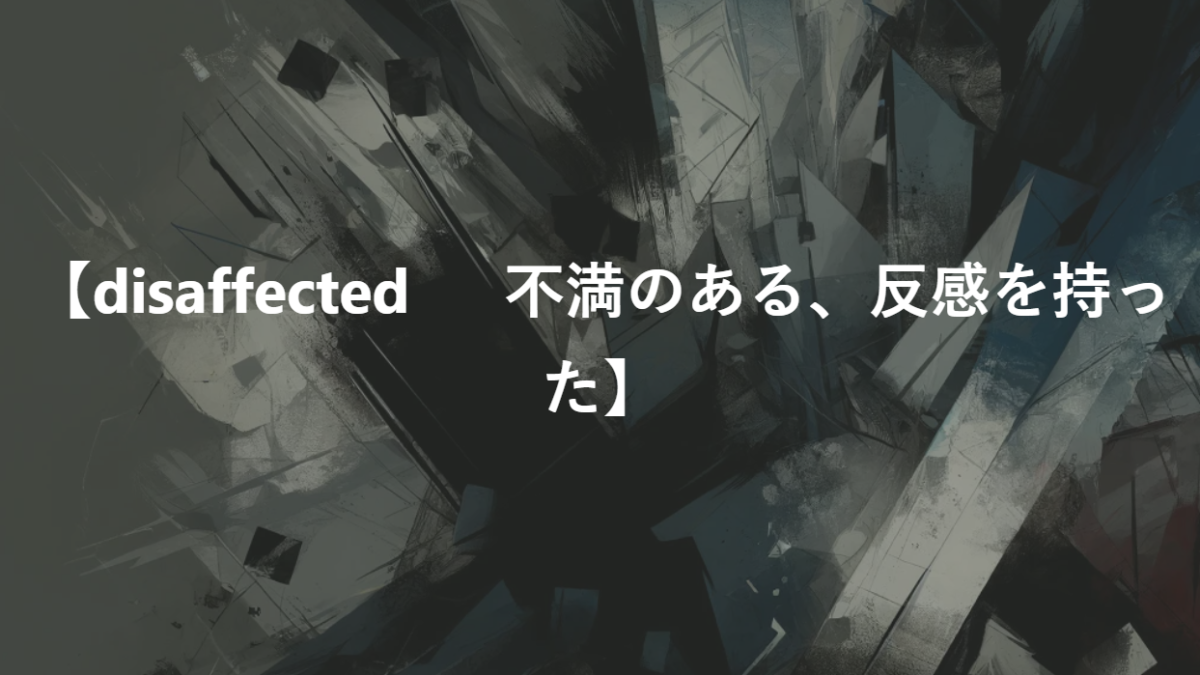【disaffected 不満のある、反感を持った】という単語の語源とか由来
「disaffected」の語源は、接頭辞「dis-」(否定を表す)と「affect」(感情や意見に影響を与える)から派生しています。この単語は、もともとは「感情や忠誠心が傷ついた」という意味で使われていましたが、現代の意味では「不満や反感を持った」というニュアンスで使用されることが一般的です。
「disaffected」は、特に政治的な文脈で使用されることが多く、政府や権力に対して不満や反感を抱いている人々を指す場合に使われます。この言葉は、社会的な不満や政治的な不信感を表現するために用いられることがあります。
The origin of “disaffected” derives from the prefix “dis-” (indicating negation) and “affect” (to influence emotions or opinions). Originally, the word was used to mean “emotionally or loyally hurt,” but in modern usage, it commonly carries the nuance of being “dissatisfied or harboring resentment.”
“Disaffected” is often used in a political context, referring to individuals who feel discontent or resentment towards the government or authorities. The term can be employed to express social dissatisfaction or political mistrust.
この単語の類義語・反対語を教えてください。
類義語:
- Alienated(疎外された)
- Disgruntled(不満を持った)
- Dissatisfied(不満足な)
- Disenchanted(幻滅した)
- Discontented(不満な)
- Disillusioned(幻滅した)
- Resentful(憤慨した)
- Displeased(不機嫌な)
反対語:
- Satisfied(満足した)
- Content(満足している)
- Pleased(喜んでいる)
- Loyal(忠実な)
- Supportive(支持している)
- Enthusiastic(熱心な)
- Affectionate(愛情深い)
- Happy(幸せな)
この単語に似た単語で間違いやすい単語はありますか?
- Disenchanted: 幻滅した。”Disaffected”と混同されがちですが、「幻滅」は期待や信頼が裏切られた結果としての感情を指し、”Disaffected”はより広範な不満や反感を示します。
- Disgruntled: 不満を持った。”Disaffected”と似ていますが、「Disgruntled」は特定の出来事や状況に対する不満を示すのに対し、”Disaffected”はより深い、持続的な不満や反感を表すことがあります。
- Dissatisfied: 不満足な。この単語は一般的な不満を表すために使われ、”Disaffected”よりも広い範囲の状況に適用されますが、政治的な文脈や深い感情的な反感を必ずしも含みません。
- Disillusioned: 幻滅した。”Disenchanted”と同様に、期待が裏切られたことによる感情を表しますが、”Disaffected”ほど政治的な反感や不満を強く示すわけではありません。
この単語を使った例文を5つほど教えてください。
The disaffected citizens took to the streets to protest against the government’s policies.
(不満を抱く市民たちは政府の政策に抗議するために街に出ました。)
The disaffected employees formed a union to address their grievances with the company.
(不満を抱く従業員たちは会社への不満を解決するために組合を結成しました。)
The disaffected voters expressed their dissatisfaction by voting for alternative political candidates.
(不満を抱く有権者たちは代替の政治候補者に投票することで不満を表明しました。)
The disaffected members of the organization wrote a letter outlining their concerns and demands.
(組織の不満を抱くメンバーたちは、自分たちの懸念や要求をまとめた手紙を書きました。)
The disaffected students boycotted classes to protest against the school administration’s decisions.
(不満を抱く学生たちは学校の管理者の決定に抗議して授業をボイコットしました。)
【disaffected 不満のある、反感を持った】のコロケーション
- Disaffected youth: 「不満を持つ若者たち」。社会や政治体制に対して不満や反感を持っている若者たちを指します。しばしば社会的な変化や革新の源泉となります。
- Disaffected voters: 「不満を持つ有権者」。現在の政治体制や政治家に対して不満を抱えている投票者を指します。これらの有権者は投票行動を変えたり、投票を棄権したりすることで、その不満を表現することがあります。
- Disaffected population: 「不満を持つ人々」。政府や経済状況に対する一般的な不満や反感を持つ人々の集団を指します。この不満は、抗議行動や社会運動につながることがあります。
- Disaffected areas: 「不満を抱える地域」。経済的に見捨てられたり、政治的に無視されたりしている地域で、住民が政府や社会に対して不満を持っています。
- Disaffected groups: 「不満を持つグループ」。特定の政策や社会的な問題に対して不満を持っている集団やコミュニティを指します。これらのグループはしばしば、変化を求めて声を上げます。
「Disaffected」という単語は、社会や政治において不満や反感を抱いている人々や集団を表すのに使われます。この形容詞は、特に若者、有権者、ある地域の人々、特定のグループなど、広範な文脈で活用されます。不満を持つ若者たちは、しばしば社会的変化の触媒となり、現状に対する批判的な視点を提供します。不満を持つ有権者は、投票行動の変更や棄権を通じて、その不満を政治的なメッセージとして送ります。また、経済的に見捨てられたり政治的に無視されたりしている地域の人々や、特定の政策や社会問題に対して不満を持つグループは、抗議行動や社会運動の形で声を上げることがあります。「Disaffected」の使用は、政府や権力構造に対する広範な不満の度合いを反映し、社会的、政治的な変化の背景にある深い感情を浮かび上がらせます。
The term “disaffected” is used to describe individuals or groups who harbor dissatisfaction or resentment towards society or politics. This adjective is utilized in a broad context, including among youth, voters, populations of certain areas, and specific groups. Disaffected youth often serve as catalysts for social change, offering critical perspectives on the status quo. Disaffected voters express their discontent through changes in voting behavior or abstention, sending a political message. People in areas that have been economically abandoned or politically neglected, as well as groups dissatisfied with specific policies or social issues, may raise their voices through protest actions or social movements. The use of “disaffected” reflects the extent of widespread dissatisfaction with government or power structures, highlighting the deep-seated emotions behind social and political change.
文法問題
問題 1:
Fill in the blank:
The employees became __ after the management announced the salary cuts without any prior notice.
- (A) enthusiastic
- (B) motivated
- (C) disaffected
- (D) loyal
正解: (C) disaffected
解説:
「disaffected」は「不満のある、反感を持った」という意味で、給与削減が事前通知なしに発表された後の従業員の気持ちを表すのに最も適しています。他の選択肢(enthusiastic: 熱心な、motivated: 動機づけられた、loyal: 忠実な)は文脈に合いません。
問題 2:
Choose the correct form of the word:
The once loyal supporters became __ after realizing the government had failed to keep its promises.
- (A) disaffected
- (B) disaffection
- (C) disaffect
- (D) disaffecting
正解: (A) disaffected
解説:
「disaffected」は形容詞で、「不満を持った」という意味です。文脈に最も適しています。他の選択肢(disaffection: 名詞、disaffect: 動詞、disaffecting: 現在分詞)は文法的に不適切です。
問題 3:
Select the sentence that uses the word correctly:
- (A) The disaffected students were thrilled with the new school policies.
- (B) The disaffected workers organized a protest against the unfair treatment.
- (C) The new manager’s approach left the team feeling disaffected and inspired.
- (D) The disaffected atmosphere in the room was filled with joy.
正解: (B) The disaffected workers organized a protest against the unfair treatment.
解説:
「disaffected」は「不満のある、反感を持った」という意味で、この文脈に適しています。他の選択肢は文法的または意味的に不適切です。
- (A) 「disaffected」は「不満のある」という意味で、文脈に合いません。
- (C) 「disaffected」と「inspired」は反対の意味を持ち、文脈に合いません。
- (D) 「disaffected atmosphere」は不適切です。
問題 4:
Identify the part of speech:
The word “disaffected” in the sentence “The disaffected citizens gathered to voice their concerns” is a:
- (A) noun
- (B) verb
- (C) adjective
- (D) adverb
正解: (C) adjective
解説:
「disaffected」は形容詞として使われており、「不満のある、反感を持った」という意味です。他の選択肢(名詞、動詞、副詞)は不適切です。
問題 5:
Correct the following sentence:
The company’s recent policies have created a sense of __ among the employees.
- (A) disaffected
- (B) disaffection
- (C) disaffect
- (D) disaffecting
正解: (B) disaffection
解説:
「disaffection」は名詞で、「不満、反感」という意味です。この文脈に最も適しています。他の選択肢(disaffected: 形容詞、disaffect: 動詞、disaffecting: 現在分詞)は文法的に不適切です。

